Related Research Articles

Theologou was one of the first vehicle manufacturers in Greece. It was created by Nikos Theologos, a Greek mechanic who had lived and worked for a few years in the US, and founded this company after he returned to Athens, Greece in 1906. Around 1916 he designed and constructed a light passenger car with a motorcycle engine; according to his descendants, the efforts had started in 1908, and since 1916 a small number were built. His company, nonetheless, produced a variety of bus and truck bodies, mostly on Ford chassis in the 1920s. By the late 1920s it was facing strong competition by larger companies like Tournikiotis and Athena in Athens, Bouhagier in Patras and others, which also produced vehicles on imported chassis, and was soon eclipsed by them.
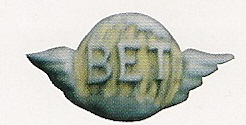
Biotechnia Ellinikon Trikyklon, or BET, was a small vehicle manufacturer founded in Athens by Petros Konstantinou. It was one of several manufacturers - the first appearing in the early 1940s - that converted BMW or other motorcycles into light utility three-wheelers. In 1965 it entirely designed and built a small five-seat passenger car with a BMW 125cc motorcycle engine. Although the type was certified, only one was built due to problems in availability of parts for further production. Following this design, three-wheeled truck models were developed and produced. A second passenger car model was designed and introduced in 1973, known as model 500, with a Fiat 500cc engine. With metal body, seating up to five passengers and featuring very good road handling, it was a rather advanced three-wheeler for its time. It was certified for production and 15 were built, of which one survives to this date in excellent condition. There were even talks with a South African company involving plans for exports or even transfer of production to that country, but they were never realized. The company ceased production in 1975.
Mego (ΜΕΓΚΟ) was a Greek light vehicle manufacturer, based in Trikala. Its first products, launched in 1947, were utility tricycles. In 1951, it began manufacturing motorized utility tricycles with 50–100cc engines and an unconventional design in which the solo wheel was located at the rear.

STYL KAR was named after its founder, the engineer Stylianos Karakatsanis. Its entire history is representative of many Greek companies who were engaged in the construction of simple utility vehicles.

Alta was a Greek manufacturer of light and heavier three-wheeler trucks, motorcycles and passenger cars. Production of motorcycles and three-wheeler trucks with Sachs 50cc engines started in its first factory in Athens in 1962. The 50S motorcycle model was known for its reliability. In 1967 it designed and developed model A700, a heavier three-wheel truck with 2-cylinder BMW 35 hp engine and a payload of 800 kg. The truck, featuring a pleasant design and high reliability became one of the most successful vehicles of its kind in Greece. In 1968 Alta introduced a three-wheel passenger car, model A200. Powered by a Heinkel 200cc engine, the car was based on the German Fuldamobil, but with Alta's own body design. The company moved production to a new, larger factory in Elefsis where it operated until 1978.
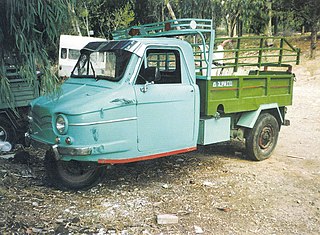
Pan-Car was a Greek producer of automobiles and light trucks, operating between 1968 and 1994. As was often the case in Greece, its name comes from that of its founder, Panayiotis Caravisopoulos. In 1968 it was one of many Greek companies that produced three-wheeled trucks, using Volkswagen engines. In 1977 it introduced beach buggy models built on Volkswagen chassis, which were produced for several years. In 1992 it introduced a jeep-type automobile, also with Volkswagen mechanicals. The model faced a problem common to such ventures in Greece, i.e., receiving type certification for production. That, and financial problems, forced the company to go out of business in 1994.
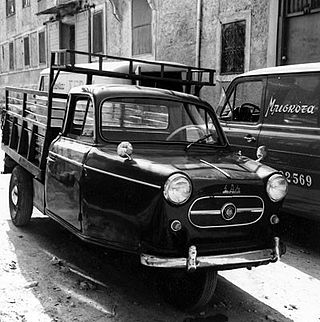
The name SAM stands for Stephanos A. Mbaltas, the founder of this Greek company, one of several that produced three-wheeler trucks in that country, in business between 1966 and 1974. Its first models used 1200cc Volkswagen air-cooled engines, while Ford 1300cc engines powered later models. The chassis developed by SAM was very robust and some of its trucks were surviving 30 years after the company went out of business.

Ros was the trade name of vehicles produced by the Greek company 'Stavros Konstantinides O.E.', based in Athens. The Ros three-wheeler trucks were the most successful of its kind in Greece, having been produced by the thousands. Ros surpassed in sales even "Greek classics" like Alta and Styl Kar, and the characteristic shape of its trucks could be seen for several years in every corner of the country. And for good reason: The 'Rosaki' was one of the most robust and reliable vehicles ever used in Greece. In 2006, 30 years after the end of three-wheeler production, several Ros were still in use in excellent condition, more than any other three-wheeler type.

AutoDiana was a Greek truck manufacturer based in Thessaloniki, in business between 1975 and 1984. Its main product was the 'Unicar' truck. This robust vehicle had a payload of 1500 kg and used a Mercedes-Benz Diesel engine and Dodge axles. Its fate, along with similar Greek multi-purpose trucks, such as Petropoulos Unitrak, the Agricola, the Motoemil Autofarma, the Balkania Autotractor, the Namco Agricar, was sealed when a change of Greek law in 1984 modified taxes and duties for such farm vehicles. Production was terminated the same year ending a career of reasonable sales among customers in the Greek countryside.
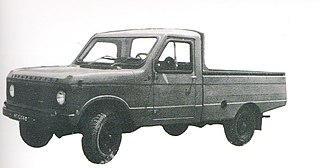
Balkania was the trade name of 'K. Zacharopoulos A.B.E.E.' a Greek industrial and trading company based in Athens that produced 4x4 jeep-type vehicles and 4x4 trucks. Since 1945, K. Zacharopoulos had been involved in vehicle repair and rebuilding. The Balkania company was founded in 1954 and since 1972 it imported Romanian and Indian vehicles. In 1975 it designed and introduced its own Autotractor model, a 4x4 multi-purpose truck with a Mercedes-Benz 3200 cc Diesel engine, metal cabin and a payload of 1,500 kg (3,307 lb). In 1979 the model was redesigned, with a modern synthetic cabin. It was produced, as some similar Greek vehicles, until a change of a favorable categorization for agricultural vehicles in 1984 limited its prospects. The vehicle was modestly successful, as it exhibited certain quality problems.
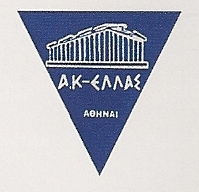
AK Hellas was a Greek manufacturer of light trucks and other metal products. It designed and produced two basic types of vehicles - all three-wheelers with 50cc engines, taking advantage of a favorable classification as "motorbikes" according to Greek law.
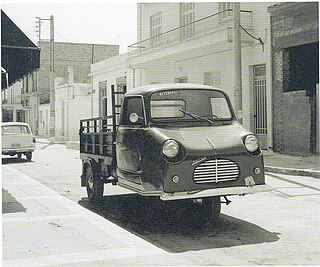
MotorCar was a Greek three-wheeler truck manufacturer, in business between 1967 and 1971. It was one of the smaller in its category, although rather "professional" in its quality of design and construction. Its models used a chassis developed by MotorCar, in two versions using Volkswagen and German Ford engines, respectively. According to their classification, both models could legally carry only 350 kg, although in practice they were loaded with up to 2 tonnes by their users.

EBIAM was a Greek company based in Thessaloniki that, among others, produced 4x4 trucks. It belonged to a generation that benefited from a Greek law classifying any vehicle that could be used for agricultural purposes as "agricultural machinery".
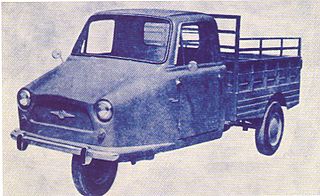
Motoemil was a Greek truck manufacturer based in Thessaloniki. It was named after Emilios Antoniades who started his business, together with his brother Konstantinos, by constructing crude-made trucks assembled from motorcycle and automobile parts. By the mid-1960s, like other similar Greek manufacturers, they were already developing and building complete "automobile" three-wheeler trucks. Motoemil was one of the first of its kind in Northern Greece and soon became the largest in that region, its products sold throughout the country. The first models used 1200cc Volkswagen air-cooled engines. A completely redesigned, more modern-looking model was introduced in 1970, using a German Ford engine.

Candia is a Greek company producing Agricultural machinery and equipment, based in Herakleion, Crete. It is representative of many companies in this country, that produced multi-purpose light farm vehicles.
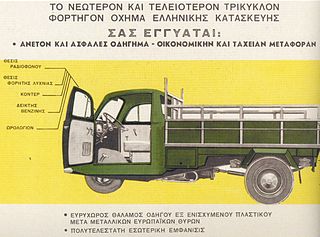
Atlas was a Greek company based in Rentis that produced three-wheel trucks and other metal structures. In business between 1967 and 1972, it used Volkswagen engines, as well as German Ford axles. Cabs were made of glass-fiber reinforced composite. Two different models were produced.
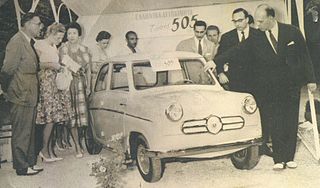
The Dimitriadis model 505 was a Greek microcar developed in 1958 by G. Dimitriadis, founder of the Bioplastic boat and automobile manufacturer. This car represented his first effort in automobile production, and was presented in a number of exhibitions in Greece. According to Mr. Dimitriadis, its production was eventually considered non-profitable compared to that of three-wheelers. Thus, he switched to the licence production of the German Fuldamobil three-wheeler.
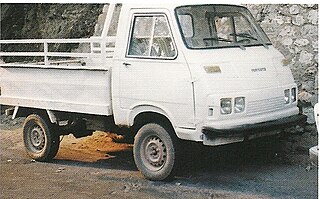
Record A.E.B.E. was the name of a Greek company producing agricultural machinery and vehicles, founded in Heraklion, Crete in 1957 and dissolved in 1999. Its products have included walking tractors, a family of characteristic Greek three-wheel vehicles combining truck and tractor functions, "proper" tractors and four-wheel trucks ; mechanical equipment like clutches and gearboxes for use in its vehicles were also produced. Its main market was Greece, although some of its walking tractors were also exported. Annual vehicle production in the late 1970s and early 1980s averaged 500 units.

Biomot was a small manufacturer of three-wheeled trucks and other metal products, based in Patras, Greece. Its trucks, produced since 1967, originally used rear-mounted VW air-cooled engines, as well as other VW parts. By 1975 the market for these vehicles had shrunk in Greece, being replaced by four-wheeled imported types. A new “modernized” front-engined model introduced by Biomot failed to save the company.
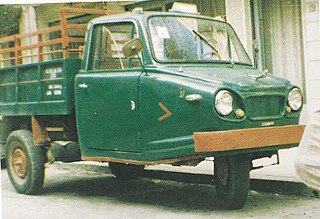
Super Car was a small manufacturer of three-wheeled trucks based in Agios Vassileios, near Patras, Greece.
References
- L.S. Skartsis and G.A. Avramidis, "Made in Greece", Typorama, Patras, Greece (2003) ISBN 960-7620-30-5 (republished by the University of Patras Science Park, 2007).
- L.S. Skartsis, "Greek Vehicle & Machine Manufacturers 1800 to present: A Pictorial History", Marathon (2012) ISBN 978-960-93-4452-4 (eBook)